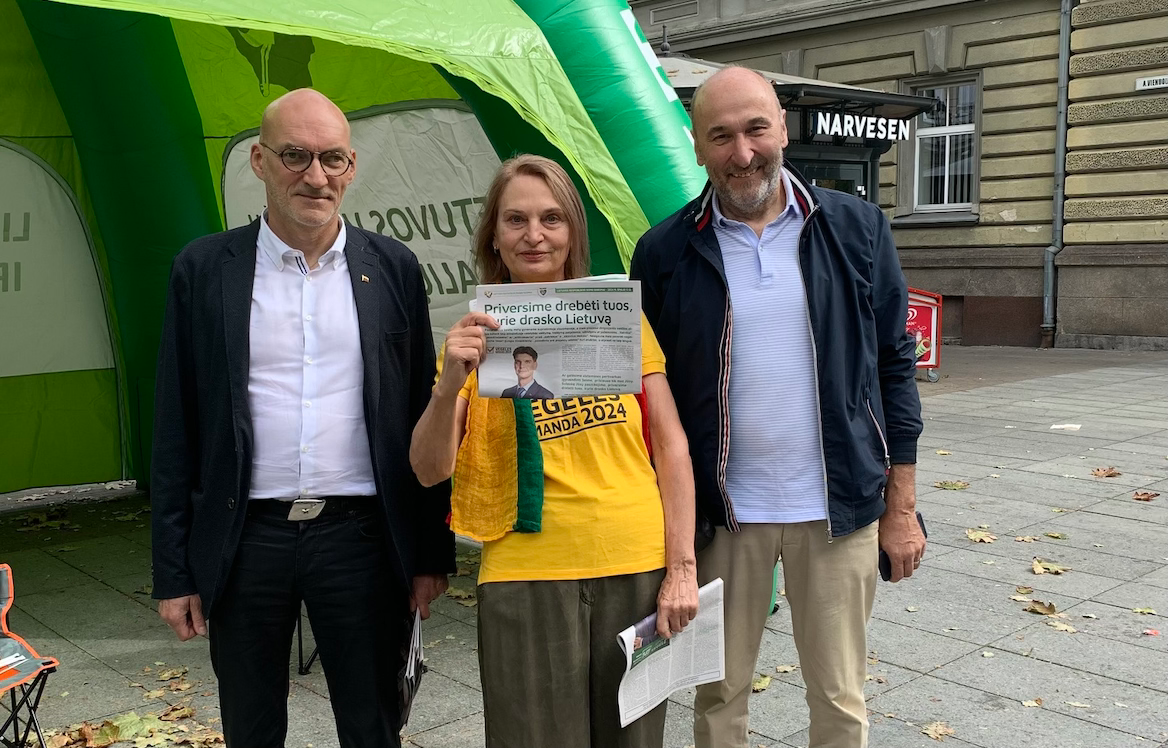Lithuania’s Parliamentary Elections: Domestic and Foreign Policy
By Ignas Kalpokas - Policy shifts to watch following Lithuanian parliamentary elections.

Lithuania’s Governing Coalition Battered in a General Election
Lithuania’s general election has resulted in a crushing defeat for the incumbent center-right government, led by Ingrida Šimonytė. The largest party of the outgoing governing coalition, the Homeland Union, lost nearly half of its seats and came a distant second with 28 MPs in the 141-seat parliament, while one of their junior coalition parties, the liberal Freedom Party, failed to win a single seat. Only one of the coalition parties, the Liberal Movement, managed to perform well, securing 12 seats (only one down from 13). Meanwhile, the big winners were the Social Democrats with 52 seats. Other parties making it to the parliament include the newly formed right-wing party, Nemunas Dawn, with 20 seats, centrist Democrats for Lithuania (14 seats) and populist Peasants and Greens (eight seats). The other seats were won by smaller parties or individual candidates. The crushing nature of the defeat has already led the chair of the Homeland Union party, outgoing Foreign Minister Gabrielius Landsbergis, to announce not only his resignation from party leadership but also his retirement from politics. The outgoing government dealt with the effects of global crises such as the COVID-19 pandemic and Russia’s full-scale invasion of Ukraine. Despite those challenges and a term marred by several scandals that led to the resignation of two ministers, it was primarily domestic politics that led to a change in government.
The Main Themes of the Election
The electoral campaign was generally fought on four fronts. The first of them was the economy and cost of living. Effectively, the campaign was largely centered around the classic question: “How do you feel about the economy?” While the Lithuanian economy is generally healthy, especially in comparison with Baltic neighbors Latvia and Estonia, much of the population is still recovering from a period of high inflation, caused by the twin shocks of the pandemic and the war in Ukraine. The effect of the latter was particularly noticeable due to an increase in energy prices. At the same time, strong regional differences remain — particularly between, on the one hand, the capital Vilnius, and (to a lesser extent) other big cities and, on the other hand, smaller towns and rural areas. Hence, the results of economic growth continue to be felt very unevenly, if at all. The parties of the governing coalition campaigned for the support of the better-off urban population, while the opposition parties primarily targeted the vote of the rural population, as well as the less economically dynamic parts of the urban electorate.
Taxation also proved to be a major issue. Here, paradoxically, the largest party in the outgoing government, the Homeland Union, campaigned on a platform very similar to much of the opposition: Already while in government they had attempted to implement tax rises for the self-employed and other groups, as well as businesses, only to be thwarted in these plans by their junior coalition partners. Hence, on the campaign trail, it was the two liberal parties against everyone else. Since taxing businesses and high earners to increase social spending continues to be a popular proposition in Lithuania, the pro-spending side has claimed a clear victory.
Another key field of contention was education and health. In both areas, the outgoing government began implementing reforms geared towards centralization and optimization, such as closing small regional schools and shifting most health services to larger regional hospitals. This was largely due to demographic circumstances — as rural populations shrink, maintenance of the existing network was economically unsustainable and failed to meet quality standards. Another factor at stake was the lack of teachers and medical personnel, which contributed to the drive toward centralization. The opposition, meanwhile, campaigned on the platform of undoing such reforms, promising to increase the accessibility of educational and health services in rural areas.
A third area of contention encompassed Lithuania’s version of culture wars, primarily focusing on the issue of same-sex partnerships. The liberal parties in the outgoing coalition, and the Freedom Party in particular, spent the previous four years unsuccessfully pushing for the establishment of a civil partnership institute. While both the Homeland Union and the opposition Social Democrats remained neutral (despite vocal support from the Homeland Union’s leadership), most opposition parties were highly critical, attempting to cast the election as a referendum on “traditional family values.” While other issues, such as abortion or decriminalization of light drugs, also featured to some extent, they did not receive comparable traction.
Meanwhile, a further aspect of the “culture wars” focused on cultural and historical memory, particularly about figures who collaborated with the Soviet regime. While the outgoing government had started a program of “desovietization” — e.g. removing monuments and renaming public spaces dedicated to such figures (again, appealing mostly to younger, more progressive urban voters) — the opposition parties aimed to label such policies as the erasure of cultural memory and stigmatization of individuals who had to make tough choices during the occupation (appealing mostly to older voters who themselves often had to make similar choices).
Finally, foreign policy was also a factor, albeit for the most part a less divisive one. In particular, except two self-styled “peace” parties that advocated for “normalization” of relations with Russia, Lithuania’s current hardline stance towards its eastern neighbor, support for Ukraine, and increased defense spending were not questioned. There is also strong societal support for such policies, illustrated by the fact that neither of the two pro-Russian parties came even close to getting into the parliament. However, there was significantly more nuance with regard to Belarus. Some of the smaller opposition parties called for a closer relationship and revocation of some sanctions imposed on Belarus, such as a ban on exporting Belorussian fertilizers through the Lithuanian port of Klaipėda. Out of such parties, one (Peasants and Greens) managed to get into the parliament and, at the moment of writing, is likely to join the new government. Nevertheless, they are not likely to have sufficient influence to change the status quo.
One area where there is likely to be some change, however, is Lithuania’s policy towards China. The outgoing government had adopted a hawkish stand towards China by implementing a human rights-focused foreign policy and opening a Taiwanese representative office in Lithuania, leading to political and economic relations with Beijing coming to a standstill. The opposition, meanwhile, had been strongly critical, citing economic losses due to stalled trade with China. Once in government, they will likely aim to revert towards more pragmatic, trade and investment-focused relations with China.
Interpreting the Results
The results of the election are likely to have only very moderate effects in terms of foreign policy, particularly concerning Russia and Ukraine. Likewise, no changes can be expected in terms of EU and NATO commitments. At least, the two major partners in the projected governing coalition, the Social Democrats and Democrats for Lithuania, are also vocally in support of increased defense spending. While that might be less of a priority for the projected junior partner, Peasants and Greens, the former parties would receive support from the pro-spending Homeland Union and Liberal Movement. The only likely change would be a softening position towards China.
The results of the election are likely to have only very moderate effects in terms of foreign policy, particularly concerning Russia and Ukraine.
Meanwhile, changes are much more likely in domestic politics. The new government is expected to increase taxes, particularly on certain groups, such as the self-employed, and income tax for higher earners (although there is still no clarity as to the details). Similarly, corporate tax rates are likely to increase as well. The revenue is expected to be directed towards increasing state pensions as well as other social benefits, and funding schools and medical facilities in rural areas. The Social Democrats also campaigned on the promise to ease stress on the housing market, for example by building more social housing, which would also be funded by additional tax revenue, such as a speculated luxury tax.
While this might sound paradoxical, the Social Democrat-led government will almost certainly abandon the progressive agenda initiated by the liberal parties in the outgoing government. In particular, same-sex partnerships will most certainly not feature in this government’s program. On the other hand, some of the more conservative agenda items (such as proposals to restrict access to abortion, made by some leading politicians from Peasants and Greens) are unlikely to gain traction either, regardless of who becomes the third coalition partner. In general, the Social Democrats have, throughout their history, become known as the status quo party, meaning that they are unlikely to engage in sweeping reforms, at least outside their priority areas of taxation and social security.
This election will also have significant consequences for the political landscape in Lithuania. On the one hand, the result points towards continued normality: The pro-Russian parties failed to get traction, whereas the newly established right-wing Nemunas Dawn party (led by Remigijus Zemaitaitis who, earlier in the year, had to resign from parliament after anti-Semitic rants), despite having come third, did not achieve the success that the far-right has recently had in countries like France or Germany, let alone Austria. Likewise, while the newly-elected MPs from the Peasants and Greens include several prominent figures from anti-vaccination and COVID conspiracy movements, they remain few and far between. Even more so, political parties representing the most radical “traditional values” activists that blended (often Q-Anon-like) conspiracy theories with anti-LGBTQ+ rhetoric failed to get a single seat. On the other hand, the Freedom Party, which was the most vocal proponent of a progressive social agenda (same-sex partnerships, decriminalization of certain drugs, etc.), has been completely wiped out at the national level and faces an uncertain future. While it has some representation at the municipal level, it seems unlikely to return to the political spotlight without radical rebranding or merging with other parties (such as the Liberal Movement from which it had once splintered).
Even more consequential will be the decision impending upon the Homeland Union, which is traditionally one of the two largest parties in Lithuania. Their recent strategy gravitated toward the political center, abandoning their traditional Christian Democrat heritage. It has come at a cost: While the party had strengthened its position in the major urban areas, the opposite happened in the more traditional rural constituencies. This election has highlighted the strategic limitations as the party failed to retain many of its urban strongholds to a concerted anti-Homeland Union campaign with no support to lean on elsewhere. With a new leadership contest approaching, the most likely contender is outgoing Minister of Defense Laurynas Kasciunas, who boasts more staunchly traditionalist credentials. Such a right turn of one of the dominant political parties will probably vacate the political center, which is good news for the Liberal Movement as it will create an opening for a more moderate centrist force.
Overall, the election will likely lead to domestic policy changes and realignment within the party system. While the exact contours of the new government remain to be established, a center-left redistribution-focused parliamentary majority is taking shape. Still, despite a domestic policy shift, Lithuania is likely to retain a similar international orientation, particularly concerning its international commitments and outlook toward the war in Ukraine.
Ignas Kalpokas is an Associate Professor and Head of MA Future Media and Journalism at Vytautas Magnus University.





